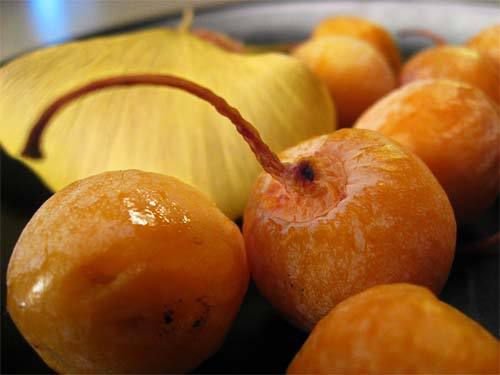Is Ginkgo Biloba for memory loss or dementia good? What science says..
As a person who likes researching about herbs and their benefits on health than conventional drugs ,I made a small research about Ginkgo Biloba which is used for brain issues (memory' mainly) in many cultures, like China's for thousand years.
One of the articles I found interesting is the one below, based on scientific research.
Ginkgo Biloba May Help Memory, but May Have Serious Health Risks
Keris Krennhrubec, Diana Zuckerman, PhD, Katherine Ip, and Caitlin Kennedy, PhD
Ginkgo biloba has been used in traditional Chinese medicine for thousands of years, and today it is one of the most popular herbal supplements, widely advertised as an antioxidant that helps prevent memory loss and dementia. Like most herbal products, however, there have been few clinical studies to see if these claims are accurate. Thanks to lobbying by companies, dietary supplements do not have to be evaluated and approved by the Food and Drug Administration (FDA) to ensure that they are safe or effective. However, studies by independent researchers suggest that these supplements may be very dangerous.
Possible Benefits
A 2008 study by Dr. Hiroko Dodge from Oregon State University at Corvallis suggests that ginkgo biloba may improve memory.[1] Dr. Dodge’s research team followed 118 people for three years. These patients were at least 85 years old, healthy, and did not have any signs of memory loss or dementia when the study started. Half of these people took ginkgo biloba, and the other half took a placebo. Throughout the study, a patient’s memory was evaluated using a 5-point scale called the Clinical Dementia Scale, which is commonly used by doctors and researchers to test memory impairment. At the end of the three years, 21 people had developed memory problems or dementia according to this scale, and most of them were in the placebo group. However, the difference between the ginkgo biloba group and the placebo group was not statistically significant. The researchers then did another analysis of their data, focused on the patients who consistently took their ginkgo biloba on a regular basis. The patients taking it regularly had a 70% lower risk of developing dementia, and this difference was statistically significant.
In 2010, German researchers performed a meta-analysis combining nine studies that tested if ginkgo biloba was more effective than placebo in reducing memory loss or Alzheimer’s disease.[2] They found that overall, worsening of memory loss or Alzheimer’s disease was less likely for people taking ginkgo biloba, compared to the people who took a placebo. Although all nine studies found ginkgo biloba to help prevent memory loss, some studies found it to be more effective than others.
The Cochrane Collaborative is a well-respected international group that provides an independent analysis of many studies. A 2009 Cochrane review of 36 studies on whether ginkgo biloba affected memory or dementia found that results were inconsistent.[3] Moreover, of the four studies that were the most recent and better designed studies in the Cochrane review, only one[4] found a benefit from taking ginkgo.
Possible Risks
Unfortunately, Dr. Dodge and colleagues found that in addition to the benefits of reducing memory loss, ginkgo biloba also may also increase the risk of strokes. By the end of the three years, seven of the patients taking ginkgo biloba had had strokes, while no patients taking the placebo did.1 Although the number of patients is small, it does raise concerns. Previous research has shown that ginkgo biloba can increase circulation and reduce the blood’s ability to clot. However, strokes are caused by blood clots, so Dr. Dodge and colleague’s observations seem to contradict the expected benefits. A larger study would be needed to find more conclusive evidence of such a risk. A 2008 study by the University of Virginia’s School of Medicine studied 3,069 patients who took either ginkgo biloba or placebo.[5] The men and women with heart disease were at greater risk of developing dementia if they took ginkgo biloba than if they took placebo. In 2013, the Center for Science in the Public Interest (CSPI) issued a warning to consumers advising against taking ginkgo biloba, because it found clear evidence that ginkgo biloba extract caused cancer in animals.[6]
Should I take Ginkgo Biloba?
Like most herbal products, nobody knows exactly how ginkgo biloba works. Even with so many studies, we just don’t know if ginkgo biloba is likely to be good or bad for individual patients. Meanwhile, we agree with the Center for Science in the Public Interest that it makes sense to avoid the drug, since the benefits are unclear and the risks could be substantial.
My only observation is if they used Biological grown seeds and leafs for the research..
Below is what Goethe wrote for this tree..
Goethe
The tree inspired the German poet so much that he wrote a poem about it. The English translation is as follows:

This leaf from a tree in the East,
Has been given to my garden.
It reveals a certain secret,
Which pleases me and thoughtful people.
Does it represent One living creature
Which has divided itself?
Or are these Two, which have decided,
That they should be as One?
To reply to such a Question,
I found the right answer:
Do you notice in my songs and verses
That I am One and Two?
Have a nice Day !
I have a tree in my city just by some fountain. Those fruits, the yellow ones stink like cheese if you ever think they could be edible lol Never tried the leaf tho.